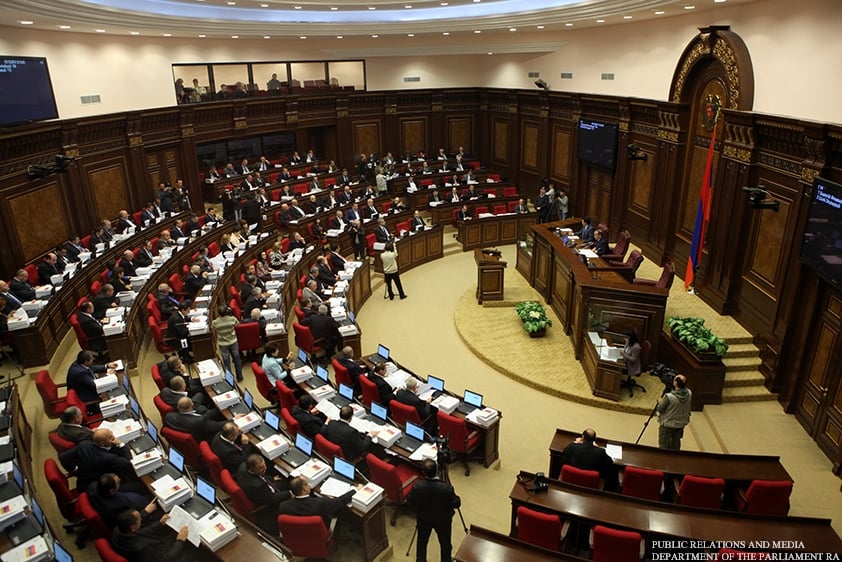There have been hearings in the National Assembly for two days, the deputies are electing the members of the Commission of Television and Radio. There are two candidates, Hakob Hakobyan (Movses) and Arthur Manukyan, both of whom were nominated by the Civil Contract Party.
The active discussions on the media field made the NA sittings a spectacle to behold. Perhaps anticipating that spectacle, the parliament has allocated a rather large amount of time for the speeches. And many managed to talk about everything. Media is our life and fertile ground for exchanging thoughts.
It seems that the CTR body, which has the function of regulating the work of surface TV and radio companies, could not become an occasion to talk about everything. But it turned out it is.
And the sessions of two days were very interesting. The media is a topic that not only touches everyone but also provides for an easy discussion. Speeches were made about a chaotic information environment with surprisingly free use of terms.
The election of the members of the CTR seemed to open the desire to speak with barely any restraint. There were references about the role of national music (Arthur Manukyan is a choir actor), about the importance of language (Hakob Movses is a poet).
There were various calls to clean the airwaves, to stop tasteless soap operas, to ensure gender equality, and to spread national values. And also education, upbringing, education again, and values again.
And although the CTR does not have the authority to interfere in the editorial policy of the media under its control (in the public multiplex), almost all the speeches were about cleaning up the content. Of course, with many digressions.
They talked about the trope of an Armenian woman who has been beaten on air and the image of an Armenian man beating women (Gegham Nazaryan, “Hayastan” bloc). About anti-government propaganda, honesty of television, and the material temptations of journalists (Emma Palyan, CC). And the fact that “the child is the mirror of the family” and women should be held accountable for how they raise the growing generation (Hripsime Hunanyan, CC).
Hrachya Hakobyan (CC) spoke about the lack of positive heroes on the air. Including the stories of superheroes who emerged from American graphic novels and became the basis of serious commercial franchises – Batman, Superman, Spider-Man, Captain America, etc. According to the deputy, the media field needs positive heroes who perform heroic deeds. He is happy that soon Public TV will present a production about such a superhero, called “Dragon.”
Representative of the “Armenia” bloc, Gegham Manukyan, made the word “terror” a pillar of discussion.
Speaking about the fact that the CTR is misunderstood as an editorial policy-making body, he addressed the journalists working in the room and the entire journalistic community.
“Terror against journalists has been going on for a long time, they are attacking from the tribune of the National Assembly, they are saying the last words. As an MP, I will apply to international organizations, this is a dangerous process in our country.”
Taguhi Ghazaryan (CC) responded to the speech about journalistic terror, saying, “There’s an impression that we are overexaggerating a little. Follow the press and you will see what reactions you have from your colleagues.”
Hrachya Hakobyan said that the current situation isn’t the “terror,” but that the burning of the “Niva” car belonging to the editor-in-chief of “Haykakan Zhamanak” newspaper is.
Lusine Badalyan (CC) also used the word “terror,” but referring not to terror against journalists, but by journalists.
And she brought the example of the case when journalists, not understanding what the deputy is saying (referring to Arthur Manukyan), instead of being ashamed, resort to terror. It is terrorizing for him when campaigns are organized against him, his family, and colleagues both in real life and on social media.
Lilit Galstyan (“Hayastan”) spoke about her work activity and the entry about it missing in the workbook, she also spoke about unregistered journalists. Lusine Badalyan and Taguhi Ghazaryan (CC) remembered the times when it was customary in the market not to register employees. Lusine Badalyan mentioned that she also worked on air every day, but it was not noted in her workbook.
In fact, this discussion was different from ordinary parliamentary sittings, it was free from gross insults and raised questions that describe the questioners very well. After all, the media is power.
Even when Vahagn Aleksanyan (CC) added another figurative description of terror, calling journalists verbal prostitutes (“Many could not distinguish and realize that they were not verbal prostitutes, but journalists”), the media still remained a power.
Nune Hakhverdyan







